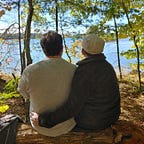Boston’s Resilience Prevails…
It was heart wrenching, watching repeated footage of twenty-year-old Henry Richard, the sun gleaning off his sweat glistened skin, stop just feet from the Boston Marathon finish line on Boylston Street to pay tribute to his little brother. At first it looked as thou he might collapse as he braced himself against the barrier between the street and the sidewalk and put his head down.
Eight-year-old Martin Richard was the youngest victim of the 2013 Marathon bombing. His life, cut far too short by hate, ended where Henry stopped. In an interview after he crossed the famed finish line, Henry said he could feel his brothers’ spirit running the race-his first-with him. The moment pinged my heart and sparked memories of that horrific day nine years ago.
First it was the shock and awe. At The Midtown Hotel I had three international running groups- proudly representing Portugal, Canada, and Germany-staying with me. Several returned to the hotel literally shell-shocked. Some had blood on their cloths from helping the wounded. All of them were scared. Yet courageously defiant, and Boston Strong, they were determined to return the following year, and did.
Next came the panic and confusion with a glimpse of what a city under lockdown looked like. My husband, Victor, works at Mass General Hospital. Our nightly routine was for him to walk from the hospital to The Castle at the corner of Columbus and Arlington Street, where Arlington becomes Herald, then we would take Herald to the highway. That night Columbus was blocked off, as was Arlington Street. He had to walk completely around the park and down Park Street to even get to my side of town. What’s more I couldn’t call to tell him where to meet me, now further up at the corner of Herald and Washington Streets, because cell phone signals were being blocked.
I sat in my car, panicking, experimenting, and discovering I could call out of the city, just not within it. Perhaps if I could call out, someone could call in. I phoned my friend Susan in Maine asking her to call Victor and tell him where to meet me. Oddly enough, it worked. As we were making our way down the highway away from Boston, a flood of black SUVs, and State Police vehicles were storming toward the city, driving home-pun intend-the fact that we were under attack.
The next thing I remember was the desolation and eerie quiet that shrouded the normally bustling city streets in the days that followed, with several city blocks cordoned off and declared part of a crime scene. On the once busy Huntington Avenue, you could hear a pin drop.
By the end of the day on Thursday, I was spent. As I sat at home debating on whether to go into the hotel on Friday, MIT Patrolman Sean Collier, only 27, was killed. A few hours later there would be a massive shootout between the Tsarnaev brothers and law enforcement in Watertown, with Tamerlan, the oldest, shot several times before being run over by his younger brother as the sadistically misguided terrorist made his escape.
Come Friday morning Victor was determined to go to work, so I put him on the train to Boston. Less than two minutes later he called me. The train wasn’t moving. All public transportation in or out of the city was stopped. I went back to get him. As we drove home, he called his boss who insisted he try to get in. She even offered to pay cab-fare, so he started calling taxis. No one was willing to drive into the city. He was officially stuck in Suburgatory.
With time on his hands, I convinced my handyman husband to tackle another project in the ongoing renovations of our home. Having just gotten the blocks delivered, Victor went about building the glass wall that would separate our foyer from the living room-as law enforcement built a virtual wall around Boston. With the news on, as police combed Watertown block by block, Victor’s wall went up the same way. By the time it was done, Dzhokhar Tsarnaev would be discovered hiding in a boat in someone’s backyard. The manhunt, like our project, was over.
I thought I was being cleaver getting the wall done at such an opportune moment, but the very poor joke was on me, since now I can’t look at the wall without thinking about that day, one permanently conjoined with the other.
The next time the city was as quiet as it was that week, we would be in the middle of a raging pandemic. This time the quiet would last much longer. In both instances Boston would emerge just that much stronger, and wiser, with the marathon coming to symbolize the city’s resilience.
As Boston wakes up from the slumber that was COVID with people boarding trains and getting back to work this year’s marathon feels like an official wake-up call. Time for our lives to return to normal. Time to get back to business and carry on. Boston has been proving its’ resilience since the Revolutionary War, and we’re still doing it-along with the rest of the country.
Thanks for stopping by.
G.
IMAGE BY: Osman Rana
